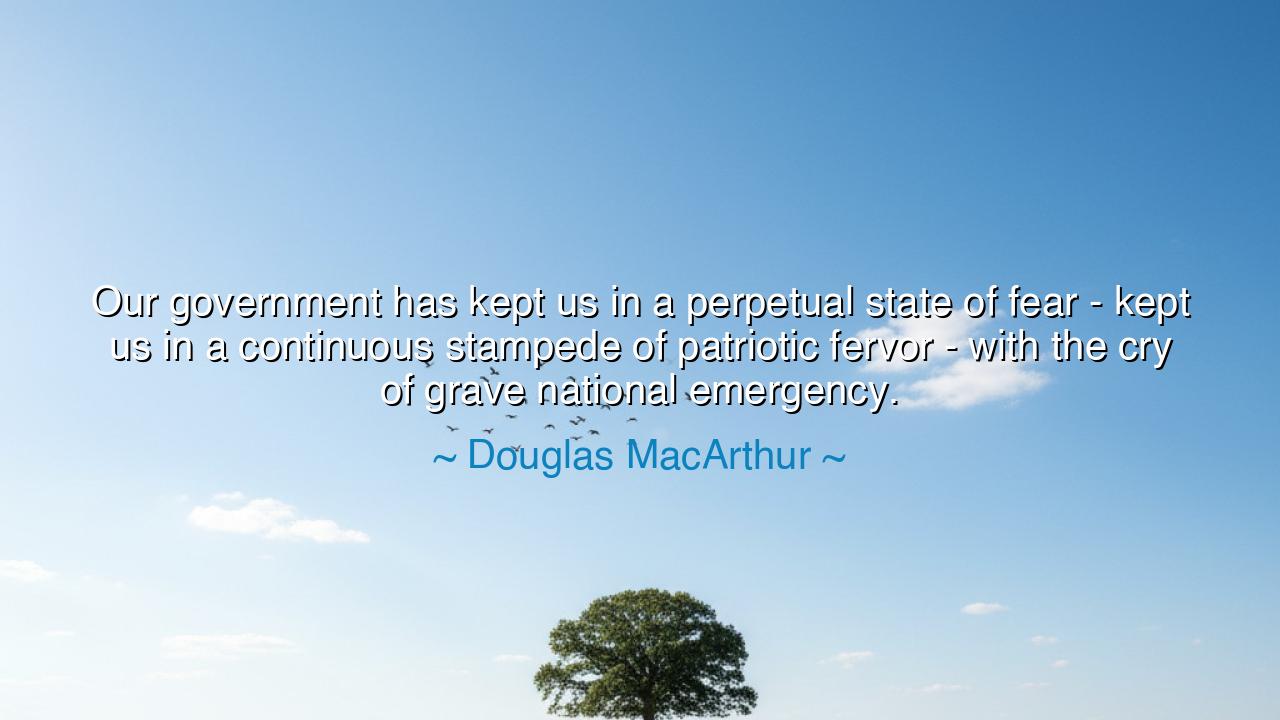
Our government has kept us in a perpetual state of fear - kept us
Our government has kept us in a perpetual state of fear - kept us in a continuous stampede of patriotic fervor - with the cry of grave national emergency.






When General Douglas MacArthur declared, “Our government has kept us in a perpetual state of fear — kept us in a continuous stampede of patriotic fervor — with the cry of grave national emergency,” he was not merely criticizing a policy; he was unveiling a pattern as old as civilization itself. From the dawn of nations, rulers have discovered that fear is the surest instrument of control. The sword may conquer bodies, but fear conquers minds. MacArthur, a soldier of immense experience and wisdom, spoke these words after witnessing how governments cloak their ambitions and failures alike under the banners of patriotism and emergency. His warning was not only for his own generation, but for all that would follow — a call to vigilance against the seductions of fear disguised as duty.
The origin of this quote lies in the turbulent years following World War II and during the Cold War, when the United States — victorious yet anxious — lived under the shadow of nuclear dread and ideological conflict. The nation that had fought to liberate the world now found itself trapped in a new form of bondage: the politics of fear. From communism abroad to disloyalty at home, crises were proclaimed, and citizens were urged to surrender freedom for security. MacArthur, who had once commanded armies across the Pacific, saw how easily noble words like “defense” and “patriotism” could become chains upon the soul. He understood that a nation constantly told it is in danger becomes one that no longer questions its leaders — and that is the first death of liberty.
His phrase, “a continuous stampede of patriotic fervor,” is particularly haunting. He likens manipulated patriotism to a herd driven by panic — hearts inflamed not by love of country, but by fear of losing it. Such fervor blinds reason, silences dissent, and transforms citizens into instruments of policy. MacArthur, a man who had given his life to the uniform, was not scorning true patriotism, but warning against its counterfeit — the kind manufactured by those who cry “emergency” to justify power. He had seen this transformation in his lifetime: during wartime censorship, the internment of Japanese Americans, and the rise of McCarthyism, when suspicion became a civic virtue and truth a liability.
One need only recall the story of Senator Joseph McCarthy to see the truth of MacArthur’s warning made flesh. In the early 1950s, McCarthy exploited America’s fear of communism to rise to power, accusing thousands of disloyalty without evidence. Careers were ruined, families destroyed, and a nation that prided itself on justice became a theater of hysteria. It was the perfect illustration of what MacArthur foresaw: a government — or its ambitious servants — keeping the people “in a perpetual state of fear.” For years, reason bowed before paranoia, and only when a few voices dared to challenge the tide did the fever begin to break.
But MacArthur’s insight reaches beyond his time and place. The cry of “grave national emergency” has echoed in every century — the justification for wars of conquest, surveillance of citizens, and the suppression of dissent. From Rome’s declaration of endless emergency during Caesar’s reign to modern governments invoking “security” to erode privacy and speech, the pattern repeats: fear becomes the weapon by which freedom is surrendered willingly. It is not always the tyrant who chains the people; often, it is the frightened citizen who hands him the key.
The general’s words, therefore, are not a condemnation of governance but a reminder of responsibility. For a free people must never trade awareness for obedience. Fear will always tempt leaders, for it unites and silences — but it is the duty of citizens to resist that temptation, to demand truth even when it is uncomfortable, and to question even when it is unpopular. The true measure of patriotism is not how loudly one salutes, but how steadfastly one guards liberty when it is most endangered by the voices of power.
The lesson is as clear as it is urgent: beware the politics of fear, for it is the oldest enemy of freedom. Let your patriotism be wise, not blind; courageous, not compliant. When the drum of emergency beats too long, listen instead for the whisper of conscience. Ask yourself who profits from your terror and who gains from your silence. For nations, like men, are not destroyed only by invasion, but by the slow surrender of their principles under the weight of fear.
And so, pass down this teaching: when your leaders cry “crisis,” remember that liberty, once given away, seldom returns. The true guardian of democracy is not the general, nor the law, nor even the government — it is the mind that refuses to be ruled by fear. Let that mind be yours. Let that courage be the legacy you leave to those who will inherit the freedom you defend not with panic, but with reason and faith.






AAdministratorAdministrator
Welcome, honored guests. Please leave a comment, we will respond soon